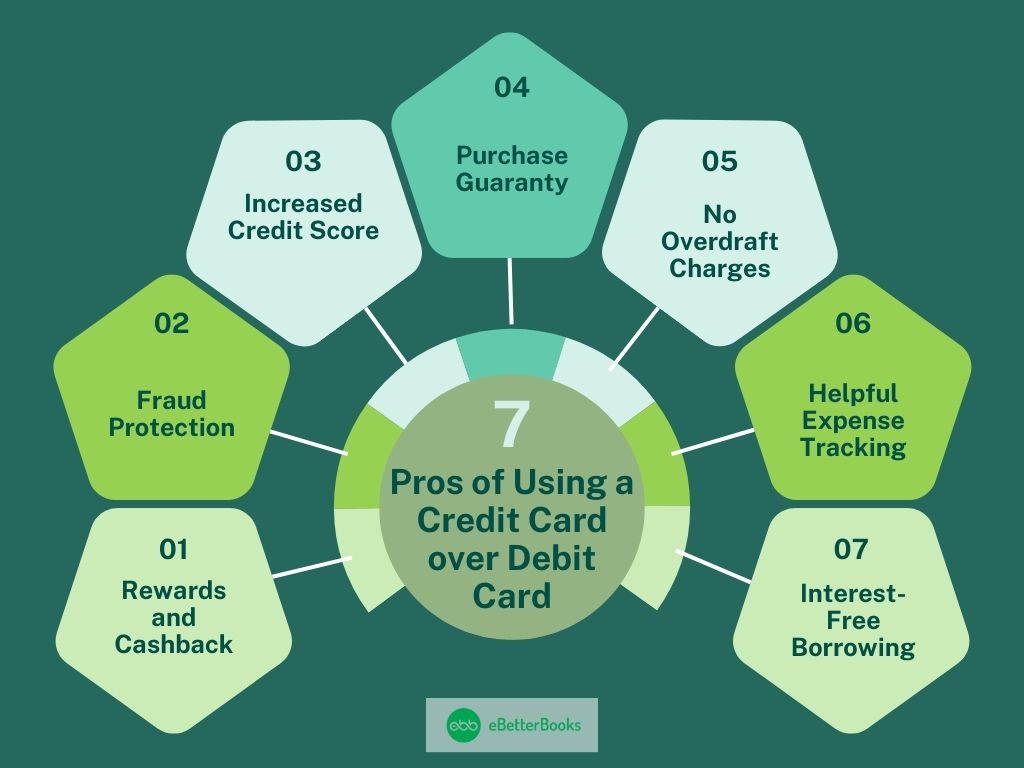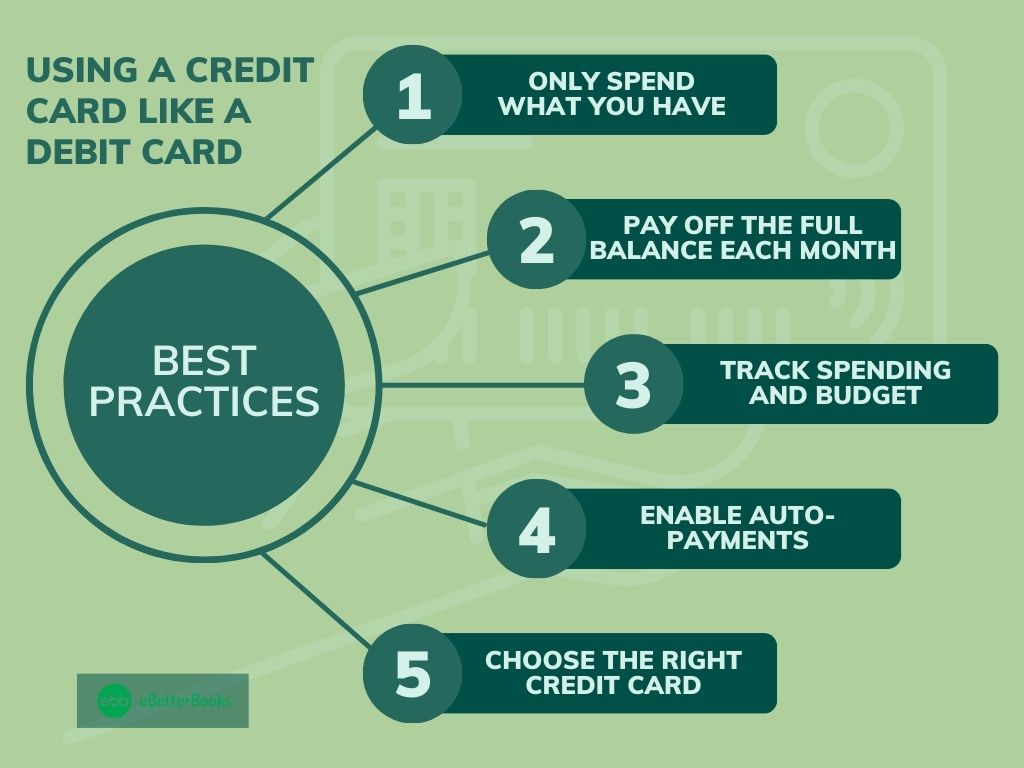Financing purchases with a credit card as a debit card implies spending what you can afford while enjoying the advantages of credit. Numerous individuals opt to use credit cards to make all their purchases to receive benefits like fraud protection, credit-building benefits, and reward programs.
This method, however, requires financial responsibility to avoid the buildup of debt and interest charges. By knowing how credit card transactions work and the possible benefits they can bring, you can make smart financial decisions that will better your financial life.
Understanding the Difference: Credit Card vs. Debit Card Transaction
Suppose shopping for $100 worth of groceries. This is a side-by-side comparison:
| Credit Card vs. Debit Card Transaction | ||
|---|---|---|
| Feature | Using a Debit Card | Using a Credit Card (Paid in Full Monthly) |
| Funds Deduction | Immediately deducted from bank account | Billed to the credit card; payment due later |
| Overdraft Risk | Possible if balance is low | No overdraft fees, but must stay within credit limit |
| Rewards Earned | None | Example: 2% cashback = $2 back |
| Fraud Protection | Limited; money is directly at risk until resolved | Stronger protection: fraudulent charges can be disputed before payment |
| Interest Charges | None | None if paid in full before the due date |
| Credit Score Impact | No impact | Builds credit if used responsibly |
| Merchant Surcharges | Rare | Some merchants charge extra for credit card payments |
| Purchase Protections | None | Possible extended warranties, chargebacks, and insurance |
| Cash Flow Management | Must have available funds at the time of purchase | Can defer payment until the statement due date, keeping cash in the bank longer |
Outcome: Responsible credit card use (paying full monthly) enables customers to earn rewards, access cash flow, and benefit from improved fraud protection without paying interest and accumulating debt.
Pros of Using a Credit Card for All Purchases
Below are the pros of using credit cards, except for debit cards:

- Rewards & Cashback: Accumulate points, cash back, or travel miles on each purchase. Rewards can amount to a lot of money over time, offsetting costs on future purchases.
- Fraud Protection: When your debit card is stolen, your money is lost directly. Credit cards provide more powerful dispute protections so that unauthorized charges won’t affect your bank balance.
- Improvement in Credit Score: Timely payments create a good credit record, which is essential for taking loans, getting a mortgage, or upgrading credit card proposals in the future.
- Purchase Guaranty: Numerous credit cards offers include extended warranties, travel insurance, and chargebacks if a retailer does not offer a refund for a faulty item.
- No Overdraft Charges: Unlike debit cards, which can cause overdraft charges if your account balance is low, credit cards avoid instant cash exhaustion, enabling more effective money management.
- Budgeting and Expense Tracking: Credit card statements give a clear picture of spending, and it is easy to track and effectively manage budgets.
- Interest-Free Borrowing: Paying off the balance early avoids interest charges while keeping cash in savings accounts where it can earn interest.
Cons and Potential Drawbacks to Consider
Using a credit card as a debit card has numerous advantages, but there are potential pitfalls:
- Overspending: The ease of using credit can lead to spending beyond your means. Solution: Set a strict budget and treat the credit card as if it were deducting money directly from your bank.
- Interest Charges: If the full balance isn’t paid by the due date, interest accrues. Solution: Always pay in full before the statement’s due date.
- Annual Fees: Credit cards have annual fees, which reduce net rewards. Solution: Opt for a credit card with no fees or ensure the rewards are more than the fees.
- Late Payment Penalties: Forfeiting a payment means fees and a hit on the credit score. Solution: Schedule automatic payments or reminders so payments are made on time.
Best Practices for Using a Credit Card Like a Debit Card

Below are some of the best habits you should opt for if you are using only credit cards instead of debit cards:
- Only Spend What You Have: Using a credit card like a debit card involves managing credit payments as if your available funds equal your set spending limit. Avoid buying things unless you possess enough funds immediately to complete the purchase.
- Pay Off the Full Balance Every Month: Settle all your statement debts each month to prevent incurring interest fees. Using credit balances leads to multiple charges that consume the earned benefits.
- Track Spending and Budget: You should use three types of tools, including budgeting tools, credit card applications, and expense-tracking software, to track your spending. This practice keeps your financial control intact and prevents expenses from exceeding your available funds.
- Enable Auto-Payments: Automatic statement balance payments should be enabled to prevent both late fees and negative credit score impact.
- Choose the Right Credit Card: Choose an appropriate credit card that supports your typical spending behaviors. Search for a credit card that offers free annual service and maximum rewards benefits, such as travel incentives or high cashback rates.
When Should You Still Use a Debit Card?
It is advised not to use credit cards for a few cases, where it can lead to high interest rates and can also damage your credit card score:
- Withdrawing Cash: Debit cards are the most suitable solution for ATM withdrawals since using credit cards to get cash advances results in immediate fees and interest.
- Avoiding Merchant Surcharges: Using debit cards helps prevent paying additional fees which selected merchants apply during credit card transactions. One benefit of using a debit card in certain transactions is that you will not face additional charges.
- For Small Purchase: Smaller payments should be processed through a debit card since doing so reduces your credit utilization ratio, which negatively affects your credit score.
Final Thoughts
There are numerous benefits to using credit cards as debit cards, along with powerful functions that debit cards specifically provide during specific transaction types. The outstanding features of credit cards include fraud protection, rewards programs, and credit-building abilities, even though some people continue to use debit cards when they need to withdraw cash or to prevent merchant fees.
The most suitable financial approach involves daily credit card use combined with the use of debit cards only for specialized purchases. Proper balance payment management, budget planning, and transaction tracking combine for maximum financial security and benefits.
FAQs
Is there a credit card that acts as a debit card?
Prepaid credit cards and secured credit cards work like debit cards by asking users to make advance payments before making purchases. Standard credit cards need to be used responsibly to prevent debt accumulation.
How do I use my credit card to make money?
The key practices include taking advantage of card rewards combined with sign-up bonuses and using statement credits to pay all statements without incurring interest charges.
Can I withdraw money from my credit card?
You can obtain cash through advances on your credit card, though the fees are high, along with instant interest application. People should make ATM withdrawals through debit cards instead of credit cards because debit cards eliminate these associated expenditures.
